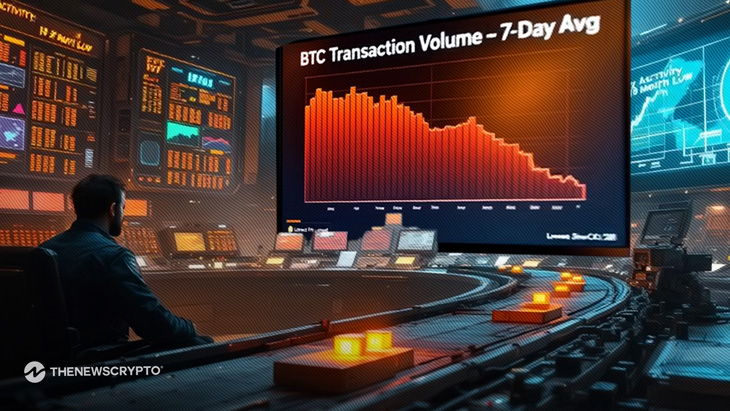[#title_feedzy_rewrite]
![[#title_feedzy_rewrite]](https://postcryptocoins.com/wp-content/uploads/2025/06/Bitcoin_network_transaction_activity_reaches_lowest_level_since-8EChgK.jpg)
Bitcoin network transaction activity has dropped to its lowest point since October 2023, according to data from The Block. The seven-day moving average reached approximately 317,000 on June 6. This marked a 19-month low and came despite Bitcoin trading near its ATH value. According to data from YChart, on June

- Bitcoin network activity dropped to a 19-month low, with just 317,000 daily transactions.
- Developers urged nodes to relay low-fee transactions as the community debates decentralization and spam concerns.
Bitcoin network transaction activity has dropped to its lowest point since October 2023, according to data from The Block. The seven-day moving average reached approximately 317,000 on June 6. This marked a 19-month low and came despite Bitcoin trading near its ATH value.
According to data from YChart, on June 1, the network processed only 256,000 operations. This volume represented one of the lowest single-day data recorded in over a year. Developers and analysts cited a reduction in on-chain demand as one contributing factor. Some transactions with fees as low as 0.1 satoshis per virtual byte (sat/vB) have still been accepted and mined.
Open-source developer Mononaut confirmed that a low-fee transaction they submitted had been mined recently. The transaction, which cost 11 sats in total, around one cent, was eventually included in a block by mining firm MARA. The transaction sat in the mempool for nearly a month before being confirmed.
MARA operates Slipstream, a pipeline designed to process non-standard or low-fee transactions. The network is currently accepting such inputs outside the default relay threshold, which remains at 1 sat/vB.
Developers Respond to Filtering Concerns
In response to the rise in filtered transactions, 31 Bitcoin Core developers released a public letter on June 6. The letter advised that nodes should continue to relay non-standard transactions if miners are willing to include them. They wrote that refusing to relay such transactions could undermine Bitcoin’s design as a censorship-resistant network.
The developers stated the following: “This is not endorsing or condoning non-financial data usage, but accepting that as a censorship-resistant system, Bitcoin can and will be used for use cases not everyone agrees on.” Based on the letter, encouraging users to use Slipstream could reduce the network’s ability to operate in a decentralized way. In their argument, signatories state that continuing through traditional nodes guarantees that everyone can use the Bitcoin network.
After the statement was published, some community members were worried. Samson Mow, the Jan3 founder, wrote on X to criticize developers for helping low-quality traffic by lowering the barriers. The policy change was said to encourage more spam in network communications. As the debate goes on, network activity for Bitcoin is decreasing and debates on how transaction policies should be shaped are also on the rise.
Highlighted Crypto News Today:
XRP Advocate John Deaton Backs Bitcoin at $106K Over $25K for Long-Term Safety

